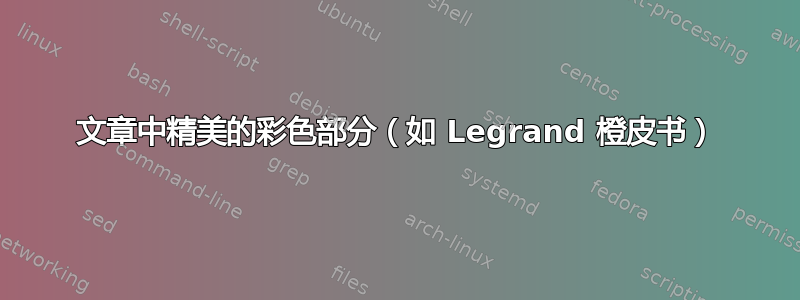
我想知道如何整理代码并使用新命令或环境来处理特殊部分。我有代码,但它不是很智能。我使用了蛮力方法。另外,部分编号是黑色的。此外,我希望部分背景会小一点。如果你有更好或更聪明的方法来使它相似,请帮忙。想法来自http://www.latextemplates.com/template/the-legrand-orange-book
\documentclass[12pt,a4paper]{article}
\usepackage{geometry}
\usepackage{xcolor}
\usepackage{amsmath}
\usepackage[some]{background}
\usepackage{lipsum}
\definecolor{titlepagecolor}{cmyk}{1,.60,0,.40}
\backgroundsetup{
scale=1,
angle=0,
opacity=.9,
contents={\begin{tikzpicture}[remember picture,overlay]
\path [fill=titlepagecolor] (current page.west)rectangle (current page.north east);
\draw [color=white, very thick] (4,0)--(4,0.5\paperheight);
\end{tikzpicture}}
}
\makeatletter
\def\printauthor{%
{\large \@author}}
\makeatother
\author{%
ghfghfg \\
Department name \\
\texttt{[email protected]}\vspace{40pt} \\
fgdfgdfgd \\
dfgdfgdfgdfg \\
\texttt{[email protected]}
}
\begin{document}
\BgThispage
\newgeometry{left=1cm,right=6cm,bottom=2cm}
\tableofcontents
\begin{abstract}
An abstract is a brief summary of a research article, thesis, review, conference proceeding or any in-depth analysis of a particular subject or discipline, and is often used to help the reader quickly ascertain the paper's purpose. When used, an abstract always appears at the beginning of a manuscript, acting as the point-of-entry for any given scientific paper or patent application. Abstracting and indexing services for various academic disciplines are aimed at compiling a body of literature for that particular subject.
\end{abstract}
\begin{titlepage}
\BgThispage
\newgeometry{left=1cm,right=6cm,bottom=2cm}
\section{\textcolor{white}{\Huge\textbf{\textsf{First section}}}}
\vspace*{0.4\textheight}
\noindent
\vspace*{2cm}\par
\noindent
\begin{minipage}{0.35\linewidth}
\begin{flushright}
\printauthor
\end{flushright}
\end{minipage} \hspace{15pt}
%
\begin{minipage}{0.02\linewidth}
\rule{1pt}{175pt}
\end{minipage} \hspace{-10pt}
%
\begin{minipage}{0.63\linewidth}
\vspace{5pt}
\begin{abstract}
An abstract is a brief summary of a research article, thesis, review, conference proceeding or any in-depth analysis of a particular subject or discipline, and is often used to help the reader quickly ascertain the paper's purpose. When used, an abstract always appears at the beginning of a manuscript, acting as the point-of-entry for any given scientific paper or patent application. Abstracting and indexing services for various academic disciplines are aimed at compiling a body of literature for that particular subject.
\end{abstract}
\end{minipage}
\end{titlepage}
\restoregeometry
\newpage
\BgThispage
\newgeometry{left=1cm,right=6cm,bottom=2cm}
\section{\textcolor{white}{\Huge\textbf{\textsf{Second section}}}}
\vspace*{0.4\textheight}
\noindent
\vspace*{2cm}\par
\noindent
\begin{minipage}{0.35\linewidth}
\begin{flushright}
\printauthor
\end{flushright}
\end{minipage} \hspace{15pt}
%
\begin{minipage}{0.02\linewidth}
\rule{1pt}{175pt}
\end{minipage} \hspace{-10pt}
%
\begin{minipage}{0.63\linewidth}
\vspace{5pt}
\begin{abstract}
An abstract is a brief summary of a research article, thesis, review, conference proceeding or any in-depth analysis of a particular subject or discipline, and is often used to help the reader quickly ascertain the paper's purpose. When used, an abstract always appears at the beginning of a manuscript, acting as the point-of-entry for any given scientific paper or patent application. Abstracting and indexing services for various academic disciplines are aimed at compiling a body of literature for that particular subject.
\end{abstract}
\end{minipage}
\end{document}
答案1
这是一个稍微干净一些的版本,但仍然有很多不足之处……
\documentclass[12pt,a4paper]{article}
\usepackage{geometry}
\usepackage{xcolor}
\usepackage{amsmath}
\usepackage[some]{background}
\usepackage{titlesec,afterpage}
\definecolor{titlepagecolor}{cmyk}{1,.60,0,.40}
\backgroundsetup{
scale=1,
angle=0,
opacity=.9,
contents={\begin{tikzpicture}[remember picture,overlay]
\path [fill=titlepagecolor] (current page.west)rectangle (current page.north east);
\draw [color=white, very thick] (4,0)--(4,0.5\paperheight);
\end{tikzpicture}}}
\makeatletter
\def\printauthor{%
{\large \@author}}
\makeatother
\author{%
ghfghfg \\
Department name \\
\texttt{[email protected]}\vspace{40pt} \\
fgdfgdfgd \\
dfgdfgdfgdfg \\
\texttt{[email protected]}
}
\titleformat{\section}[hang]{%
\BgThispage\color{white}\Huge\bfseries\sffamily
}{\thesection}{1.5em}{}
\newcommand\myabstract[2][\printauthor]{%
\vspace*{.5\textheight}\par
\noindent
\begin{minipage}{0.35\linewidth}
\begin{flushright}
#1
\end{flushright}
\end{minipage}\hspace{15pt}
%
\begin{minipage}{0.02\linewidth}
\rule{1pt}{175pt}
\end{minipage}\hspace{-10pt}
%
\begin{minipage}{0.63\linewidth}
\vspace{5pt}
\begin{abstract}
#2
\end{abstract}
\end{minipage}
\restoregeometry}
\begin{document}
\newgeometry{left=1cm,right=6cm,bottom=2cm,showframe}
\savegeometry{geometrysec}
\tableofcontents
\loadgeometry{geometrysec}
\section{First section}
\myabstract{%
An abstract is a brief summary of a research article, thesis, review, conference proceeding or any in-depth analysis of a particular subject or discipline, and is often used to help the reader quickly ascertain the paper's purpose. When used, an abstract always appears at the beginning of a manuscript, acting as the point-of-entry for any given scientific paper or patent application. Abstracting and indexing services for various academic disciplines are aimed at compiling a body of literature for that particular subject.}
Some text.
\loadgeometry{geometrysec}
\section{Second section}
\myabstract{%
An abstract is a brief summary of a research article, thesis, review, conference proceeding or any in-depth analysis of a particular subject or discipline, and is often used to help the reader quickly ascertain the paper's purpose. When used, an abstract always appears at the beginning of a manuscript, acting as the point-of-entry for any given scientific paper or patent application. Abstracting and indexing services for various academic disciplines are aimed at compiling a body of literature for that particular subject.}
Some more text.
\end{document}



